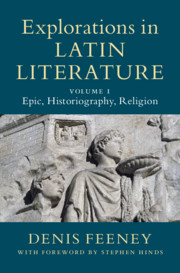Book contents
- Explorations in Latin Literature
- Explorations in Latin Literature
- Copyright page
- Dedication
- Contents
- Foreword
- List of Acknowledgements and Original Places of Publication
- Introduction
- Chapter 1 The Taciturnity of Aeneas
- Chapter 2 The Reconciliations of Juno
- Chapter 3 Epic Hero and Epic Fable
- Chapter 4 Stat magni nominis umbra: Lucan on the Greatness of Pompeius Magnus
- Chapter 5 History and Revelation in Virgil’s Underworld
- Chapter 6 Following after Hercules, in Virgil and Apollonius
- Chapter 7 Beginning Sallust’s Catiline
- Chapter 8 Leaving Dido: The Appearance(s) of Mercury and the Motivations of Aeneas
- Chapter 9 Epic Violence, Epic Order: Killings, Catalogues, and the Role of the Reader in Aeneid 10
- Chapter 10 Mea tempora: Patterning of Time in Ovid’s Metamorphoses
- Chapter 11 Interpreting Sacrificial Ritual in Roman Poetry: Disciplines and their Models
- Chapter 12 Tenui … latens discrimine: Spotting the Differences in Statius’ Achilleid
- Chapter 13 On Not Forgetting the ‘Literatur’ in ‘Literatur und Religion’: Representing the Mythic and the Divine in Roman Historiography
- Chapter 14 Virgil’s Tale of Four Cities: Troy, Carthage, Alexandria and Rome
- Chapter 15 First Similes in Epic
- Chapter 16 Fictions of Citizenship in Livy’s History
- Published Works of Denis Feeney
- Bibliography
- Index locorum
- General Index
Chapter 14 - Virgil’s Tale of Four Cities: Troy, Carthage, Alexandria and Rome
Published online by Cambridge University Press: 05 August 2021
- Explorations in Latin Literature
- Explorations in Latin Literature
- Copyright page
- Dedication
- Contents
- Foreword
- List of Acknowledgements and Original Places of Publication
- Introduction
- Chapter 1 The Taciturnity of Aeneas
- Chapter 2 The Reconciliations of Juno
- Chapter 3 Epic Hero and Epic Fable
- Chapter 4 Stat magni nominis umbra: Lucan on the Greatness of Pompeius Magnus
- Chapter 5 History and Revelation in Virgil’s Underworld
- Chapter 6 Following after Hercules, in Virgil and Apollonius
- Chapter 7 Beginning Sallust’s Catiline
- Chapter 8 Leaving Dido: The Appearance(s) of Mercury and the Motivations of Aeneas
- Chapter 9 Epic Violence, Epic Order: Killings, Catalogues, and the Role of the Reader in Aeneid 10
- Chapter 10 Mea tempora: Patterning of Time in Ovid’s Metamorphoses
- Chapter 11 Interpreting Sacrificial Ritual in Roman Poetry: Disciplines and their Models
- Chapter 12 Tenui … latens discrimine: Spotting the Differences in Statius’ Achilleid
- Chapter 13 On Not Forgetting the ‘Literatur’ in ‘Literatur und Religion’: Representing the Mythic and the Divine in Roman Historiography
- Chapter 14 Virgil’s Tale of Four Cities: Troy, Carthage, Alexandria and Rome
- Chapter 15 First Similes in Epic
- Chapter 16 Fictions of Citizenship in Livy’s History
- Published Works of Denis Feeney
- Bibliography
- Index locorum
- General Index
Summary
The depiction of Troy and Carthage in Virgil’s Aeneid is influenced by the very recent events of the civil war between the future Augustus and Mark Antony and Cleopatra. The orientalising propaganda directed against Cleopatra and her city of Alexandria has left its mark on the depiction of Carthage and Dido, whose temptations for Aeneas recall the temptations of Alexandria and Cleopatra for Mark Antony. The victory at Actium over Antony and Cleopatra represents the defeat of a threat of a Roman reversion to their Eastern origins in Troy.
- Type
- Chapter
- Information
- Explorations in Latin Literature , pp. 271 - 285Publisher: Cambridge University PressPrint publication year: 2021

